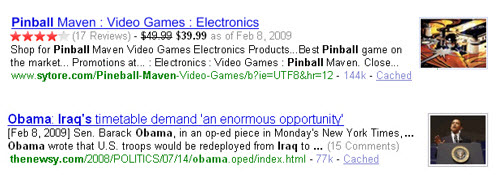 On Thursday, the US search engine giant has included several two exciting and interesting features in its open developer platform, SearchMonkey, in a bid to help site owners enrich the results that their pages generate on Yahoo Search. The two features are a new enhanced results and the support of Google Base formatting for structured data feeds. Let’s take a look at these two updates.
On Thursday, the US search engine giant has included several two exciting and interesting features in its open developer platform, SearchMonkey, in a bid to help site owners enrich the results that their pages generate on Yahoo Search. The two features are a new enhanced results and the support of Google Base formatting for structured data feeds. Let’s take a look at these two updates.
Launched in March 2009, SearchMonkey is developer platform whereby developers and site owners are able to use structured data to make Yahoo! Search results more useful and visually appealing, and drive more relevant traffic to their sites. It allows them to embed video, games, and documents in Yahoo! Search results. Yahoo said that it will expand its tools for enhanced search results to items such as products, news and events.

Enhanced results bring users the information they need while helping site owners stand out on the search results page. You can add code to display local information as enhanced results with phone numbers and addresses. You can also display location and date for festivals, concerts, and other events.
Besides that, the Californian-based company is also announcing it will accept five types of feeds from Google Base, Google’s online repository for user-generated structured data. They include Event, Product, Review, Job, and Personals. Developed in the late 2005, Google Base allows users to submit all types of online and offline content and the clever system will then make them searchable on Google. This newly added feature is quite significant as it enables Google Base users can submit their existing Google Base feeds to Yahoo Site Explorer to have those feeds represented in Yahoo Search. In addition, Yahoo Site Explorer will convert that feed to DataRSS XML so it can be stored within Yahoo and accessed by third-party search engine developers who use Yahoo’s BOSS (Build Your Own Search Service).
In my own opinion, the folks at Yahoo plans to keep up with newcomer Bing by rolling out new features to attract more users to use its engine as the Microsoft start-up has edged past Yahoo’s search engine market share in just two weeks online.